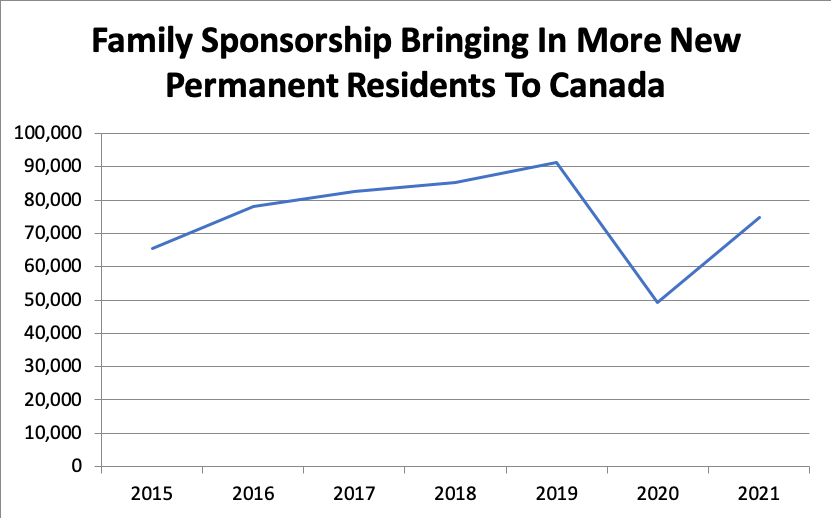By Yash Yadav
Canada’s family sponsorship immigration programs saw newcomers show up in more noteworthy numbers in 2021 than during the earlier year – however, numbers were still lower than preceding the Covid-19 pandemic.
The most recent Immigration, Refugees and Citizenship Canada (IRCC) figures reveals that in the initial 10 months of 2021, about 62,245 new permanent inhabitants showed up in Canada through family sponsorship programs, 26.2 per cent more (49,305) than the new permanent occupants that went under those programs in all of 2020.

At that rate, Canada could hope to end 2021 with 74,694 new permanent residents showing up under family sponsorship programs. That would make the number of newcomers to Canada under these projects 51.5 per cent more than the similar associate in 2020.
That extended number of family sponsorship, however, would, in any case, be 18.1 per cent than the 91,300 new permanent occupants to Canada under these projects in 2019, the last entire year before the appearance of Covid-19 in Canada.
During the first year of the pandemic specifically, line terminations and travel limitations – and, later, Covid-19 tests at the borders, mandatory isolations, and vaccine passports – eased down the immigration to a large extent.
Immigration hiked up in Canada in 2021 Amid Covid-19 Recovery
In the main year of the pandemic, 156,590 fewer immigrants came to Canada than in 2019. New permanent residents to Canada in 2020 numbered just 184,585, or nearly 45.9 per cent less than the 3,41,175 the earlier year.
From that point forward, immigration to Canada has bounced back intensely with 4,01,000 new permanent residents to Canada in 2021.
“Last year, we set an ambitious goal,” said Immigration Minister Sean Fraser a week before the end of the year. “Today, we achieved it. This is a historic moment for our country, as we welcome the highest number of newcomers in one year in our history,” he added.
The last figures for 2021’s family sponsorship programs were not yet released as of the end of December. It is apparent, however, that these programs had been consistently growing in popularity prior to the pandemic.
In the five years that finished on December 31, 2019, the yearly number of permanent residents to Canada under these programs grew by 39.4 per cent, from 65,485 in every 2015 to 91,300 out of 2019.
Even allowing for the hit in immigration Canada suffered from two years of the pandemic, the yearly number of new permanent residents through family sponsorship programs is as yet expected to be practically 14.1 per cent higher for 2021 than it was in 2015.
Family Sponsorship Allows Relatives to Gain Permanent Residency
Under family sponsorship programs, a Canadian resident or a permanent resident of Canada, aged at least 18 can support specific relatives to become Canadian permanent residents. With that permanent residence, those relatives can reside, study and work in Canada. The sponsor accepts all financial responsibilities for their relative once the individual shows up in Canada.
To be a sponsor, the Canadian resident or permanent resident must:
- sign a sponsorship agreement with the relative that commits the sponsor to offer financial help for the family member, if essential. This agreement also says that the person becoming a permanent resident will make every effort to support him or herself;
- offer financial help for a spouse, common-law or conjugal partner for a period of 3 years from the date they become a permanent resident, and;
- offer financial support for a dependent child for a period of 10 years or until the kid turns 25, whichever comes first
Family members who can be sponsored include:
- spouse – (restrictions apply)
- common-law partner – (restrictions apply)
- conjugal partner – (restrictions apply)
- dependent children
- parents – (Additional conditions apply)
- grandparents – (Additional conditions apply)
- brothers or sisters, nephews or nieces, granddaughters or grandsons who are orphaned, under 18 years of age and not married or -in a common-law relationship.
- another relative of any age or relationship but only under specific conditions
- accompanying relatives of the above (for example, spouse, partner and dependent children).
Spouses and common-law partners who come to Canada under the sponsorship programs are permitted to work under the Spousal Work Permit Pilot Program. The program is intended to permit spouses and partners to work while their immigration applications are being settled.
Qualified applicants should be in Canada and during the time spent being supported for permanent residence under the spouse or common-law partner class. Candidates should likewise have valid temporary status as a visitor, students or workers.
Under the sponsorship programs, sponsors ink an agreement with Canada’s immigration authorities to compensate the public authority for any social assistance payments made to the sponsored person. Sponsors stay committed to the undertaking agreement for the entire period of the contract, even in a change of situations such as marital breakdown, separation, divorce, or an economical change in circumstances.
Sponsors of Spouses Assume Responsibility for Children
On account of a spouse, common-law partner or conjugal partner, support is needed to sign an undertaking to repay the administrative or provincial government from the date where they become a permanent resident for the time of three years.
On account of a child younger than 19 years, of the support or the companion, common-law partner, or conjugal partner, the obligation begins the day that the child turns into a permanent resident of Canada for a time of 10 years or until the child reaches at the age of 25 years.
In the case of a dependent child over 19 years old, the obligation begins the day that the dependent child turns into a permanent resident, for a time of three years.
On account of guardians and grandparents, the sponsorship obligation extends for a period of 20 years from the date where the individual from the family class turns into a permanent resident. For any remaining relatives, the obligation is of a span of 10 years.
Read all the Latest News here. Follow us on Facebook, Twitter, Instagram, and LinkedIn.


















1 comment